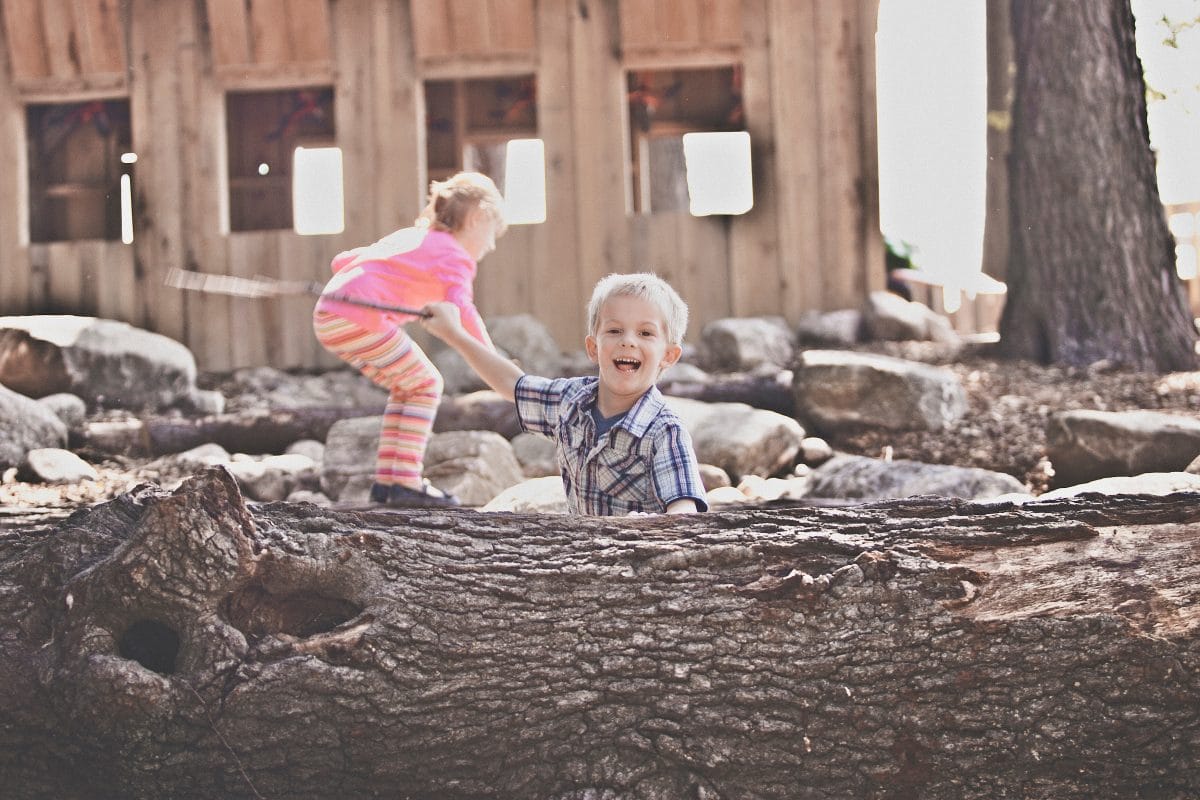Keeping it Real

“We feel that our children get plenty of opportunities for virtual screen time outside of our school. Here, we focus on giving them real experiences; with real materials, real people, real ideas and real places.” —Chris Whitmire
The Early Learning Center (ELC) of the Granger Community Church in Granger, Indiana is a progressive, Christian faith-based school, in which nature is a main teacher. Principal Chris Whitmire was tasked five years ago with developing the pre-K through kindergarten school. Her own childhood had been filled with outdoor play, from stickball and climbing trees, to harvesting in gardens and collecting bugs. Knowing that today’s children typically get very little time in nature, she drew from her childhood outdoor activity and learning to inform her plans for the school. Within three years, it had a Certified Nature Explore Outdoor Classroom.
The ELC’s outdoor classroom sits on over an acre of land at the edge of a small forest. Called the “Natural Playground,” it has among other attractions, a covered bridge made of century old barn wood, a butterfly garden, nine raised planter boxes, a dry creek bed, and chainsaw carvings of a bear and a soaring eagle!
The school serves about 125 children, with 80 attending each day. ELC’s curriculum draws from HighScope and the Project approaches for hands-on, child-centered learning experiences. From the children’s activities, teachers will scaffold new levels of learning in many different areas of development.
For many parents, the ELC is their first encounter with experience-based learning. Some can be understandably concerned that the more familiar form of lesson-based teaching is not a main focus of the school. Chris notes that the results of the ELC’s curriculum and outdoor experiences speak for themselves. “We have had children in our kindergarten classroom that were reading at the 4th grade level when they have left our school. We have children in our three to five mixed age groups that are reading and writing easily,” she says. She also notes that children in her school show character development unusual for their age group. “Across the board, our children seem more confident, and they seem to interact very well with adults, and are comfortable with adults as co-learners. They also ask a lot of questions. And I think it’s because we ask them so many questions that are open-ended.”
The ELC’s outdoor experiences address both academic skills and character development. The appropriate risk-taking that can be managed in the outdoor classroom contributes to developing initiative and perseverance. Chris works with both teachers and families to ensure that the ELC is an environment where these important character traits are developed, nurtured and celebrated.
A recent activity captures this spirit of adventure. As the Nature Playground’s raised planter beds were being refilled with topsoil, a group of three-year-olds watched. Soon they began dragging boards over to the planters, placing them between the top edges of the wood frames, a foot above the ground. They placed some of the boards (3in. x 4ft., and 6in. x 4 ft.) between the planters, and some as ramps up the sides. For about fifteen minutes these young children experimented with different ways to walk up the short ramps and continue between the planters, without touching the ground. Because the children are accustomed to taking manageable risks, the ramps were made and tested carefully, and no one got hurt. Teachers were present as co-experimenters, with their role to support and extend but not interfere with the learning. Compare the quality of this experience to the kinds of risk-taking involving traditional playground equipment.
Returning to Chris’ intention to develop initiative and perseverance, we can see the importance of the Natural Playground, and of the relationship between the children and teachers. In today’s highly protected world, for a three-year-old, the ELC is a rare environment. Here, children are permitted to take the manageable risks they are rarely allowed elsewhere in their lives. Seeing the boards and the planters, these three-year-olds combined the two into a new challenge. They know they can try out their ideas under the trained eyes of trusted teachers. They can take manageable risks to test their learning. They need each other to perform this task, developing social skills of cooperation and self-control. Along with developing important body awareness, academic, and problem solving skills; these children were also expressing initiative and perseverance.
Chris’s students’ use of real lumber to make real ramps in the real world involved observations, estimations, judgments, gross motor development, theorizing, hypothesis testing, balance, teamwork, and much more. They imagined a problem and designed the solution. The many skills they exercised during this one, simple project will be developed and extended in many activities to come.
We opened this post with a quote from Chris. Knowing that children already get screen time at home, she wants to ‘keep learning real’ at her school. We are thrilled that connecting children with nature is such an essential element of her mission.

